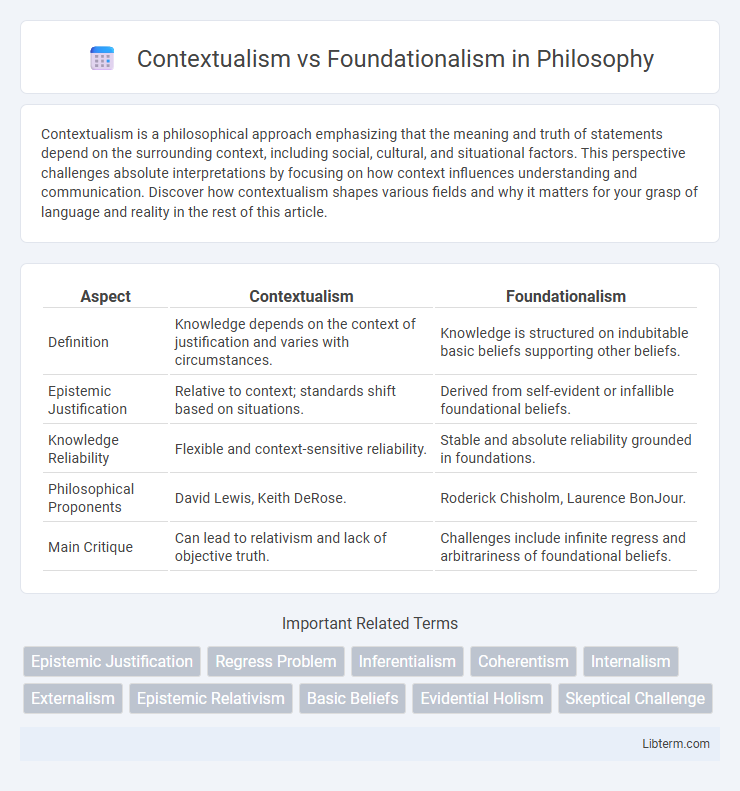Contextualism is a philosophical approach emphasizing that the meaning and truth of statements depend on the surrounding context, including social, cultural, and situational factors. This perspective challenges absolute interpretations by focusing on how context influences understanding and communication. Discover how contextualism shapes various fields and why it matters for your grasp of language and reality in the rest of this article.
Table of Comparison
| Aspect | Contextualism | Foundationalism |
|---|---|---|
| Definition | Knowledge depends on the context of justification and varies with circumstances. | Knowledge is structured on indubitable basic beliefs supporting other beliefs. |
| Epistemic Justification | Relative to context; standards shift based on situations. | Derived from self-evident or infallible foundational beliefs. |
| Knowledge Reliability | Flexible and context-sensitive reliability. | Stable and absolute reliability grounded in foundations. |
| Philosophical Proponents | David Lewis, Keith DeRose. | Roderick Chisholm, Laurence BonJour. |
| Main Critique | Can lead to relativism and lack of objective truth. | Challenges include infinite regress and arbitrariness of foundational beliefs. |
Introduction to Contextualism and Foundationalism
Contextualism and foundationalism represent two influential epistemological theories that address the nature and structure of knowledge. Foundationalism asserts that knowledge is built upon basic, self-evident beliefs or foundations that provide support for other beliefs, establishing a hierarchical structure. Contextualism challenges this view by emphasizing that the truth value and justification of knowledge claims depend on varying contexts, highlighting the role of situational factors in epistemic evaluation.
Defining Contextualism: An Overview
Contextualism in epistemology asserts that the truth-conditions of knowledge claims vary depending on the context of the speaker, emphasizing situational factors in determining justification. This theory contrasts Foundationalism, which holds that knowledge is built on basic, indubitable beliefs serving as the secure foundation for all other knowledge. Contextualism accounts for shifts in epistemic standards and highlights how context influences the criteria for what counts as knowledge.
Foundationalism Explained: Core Principles
Foundationalism is an epistemological theory asserting that knowledge and justified beliefs are structured like a building, resting on a base of self-evident or indubitable foundational beliefs. These core principles include the notion that certain basic beliefs provide the ultimate justification for other non-foundational beliefs, ensuring a clear and secure epistemic framework. Foundational beliefs are usually infallible, evident, or immune to doubt, serving as the unshakeable groundwork upon which all further knowledge is constructed.
Historical Development of Both Theories
Contextualism and foundationalism emerged as prominent epistemological theories during the 20th century, with foundationalism tracing its roots back to Descartes' quest for indubitable knowledge and gaining structure through early modern philosophy. Contextualism developed more explicitly in the latter half of the 20th century, influenced by Wittgenstein's language games and later philosophers like David Lewis, emphasizing the variable standards of knowledge depending on context. Debates between epistemologists such as Alvin Goldman and Keith DeRose highlight the evolving historical discourse and refinement of both theories throughout contemporary philosophy.
Key Differences Between Contextualism and Foundationalism
Contextualism emphasizes that knowledge and justification depend on varying contexts, where the truth of a statement can shift based on different standards or situations. Foundationalism asserts a structure of knowledge built upon basic, self-evident beliefs that serve as secure foundations for all other beliefs. The key difference lies in contextualism's fluid criteria for knowledge versus foundationalism's fixed, indubitable starting points.
Strengths and Weaknesses of Contextualism
Contextualism excels by adapting knowledge claims based on varying contexts, enhancing flexibility and practical relevance in epistemology. Its strength lies in addressing skepticism through context-sensitive standards, but this flexibility sometimes leads to vagueness and challenges in establishing stable criteria for knowledge. Critics argue that contextualism's dependence on shifting contexts can undermine universal objectivity and complicate cross-contextual communication.
Strengths and Weaknesses of Foundationalism
Foundationalism offers a clear structure for knowledge by grounding beliefs in basic, self-evident principles, which enhances epistemic certainty and reduces infinite regress. Its main strength lies in providing a stable base for justification, supporting logical coherence and clarity in argumentation. However, foundationalism struggles with defining truly indubitable foundational beliefs and can face challenges accommodating the complexity of knowledge that depends on context or evolving evidence.
Major Thinkers and Influential Works
Major thinkers in contextualism include David Lewis, known for "Attitudes De Dicto and De Se," and Stewart Shapiro, who emphasized context-sensitive epistemic standards. Foundationalism is significantly shaped by Rene Descartes with "Meditations on First Philosophy" and Edmund Gettier's critique challenging basic foundational beliefs. Contemporary discussions often contrast Laurence BonJour's defense of coherent foundational beliefs with Keith DeRose's robust contextualist accounts.
Contextualism vs Foundationalism in Epistemology
Contextualism in epistemology asserts that the truth-conditions of knowledge claims vary depending on the context, emphasizing the role of situational factors in determining what counts as knowledge. Foundationalism posits that knowledge is structured hierarchically, based on basic, self-evident beliefs that support all other knowledge claims. The debate centers on whether epistemic justification relies on an inflexible foundation of indubitable beliefs or shifts dynamically with contextual standards.
Contemporary Debates and Future Directions
Contemporary debates in epistemology emphasize the conflict between Contextualism, which argues that the truth conditions of knowledge claims vary with the speaker's context, and Foundationalism, which maintains that knowledge is built upon indubitable basic beliefs. Current research explores hybrid models combining contextual factors with foundational structures to address skepticism and cognitive limitations. Future directions involve integrating insights from cognitive science and artificial intelligence to refine epistemic frameworks and enhance the understanding of knowledge acquisition processes.
Contextualism Infographic

 libterm.com
libterm.com